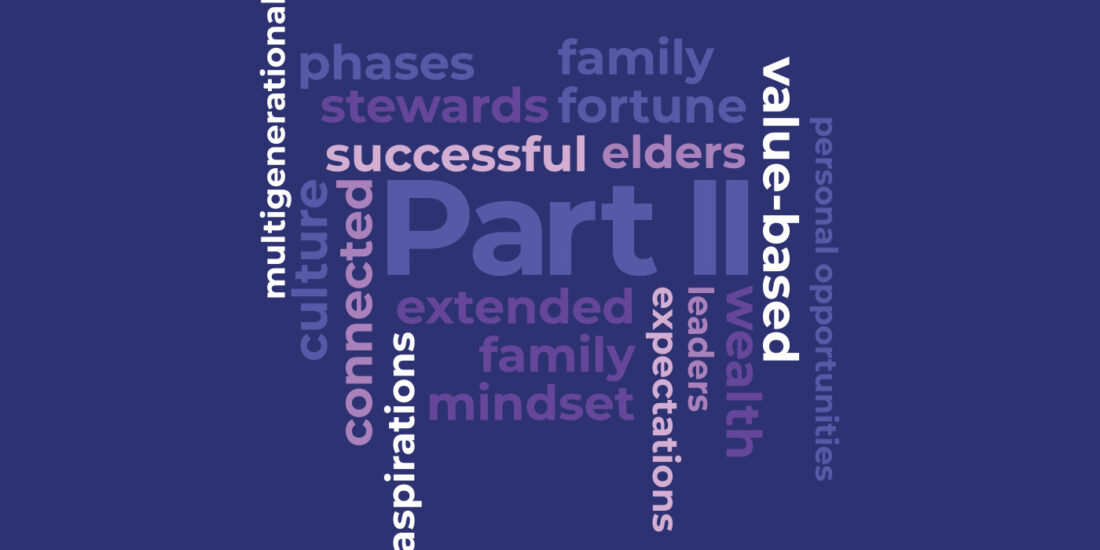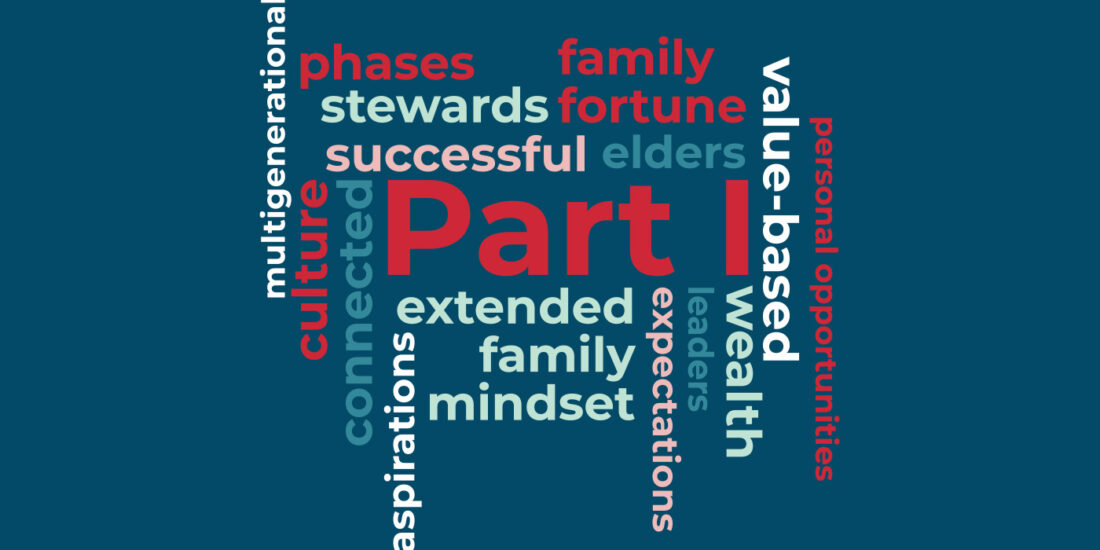
Governance
Authors’ opinions and reflections on family governance strucutures suitable for use with various generational, cultural and industry related clients.
Getting It “Just Right”: The Goldilocks Zone of Family Board Involvement in Family Firms
Thank you to Peter Jaskiewicz, James G. Combs, Klaus Uhlenbruck, Amlan Datta, and Katrina Barclay for this week’s FFI Practioner issue, a commentary on their research about the effect of family board involvement on family firms.
Measuring Performance in Family Enterprises: An Interview with Sir Andrew Likierman
FFI Practitioner is pleased to feature a podcast conversation with Sir Andrew Likierman, 2025 recipient of the 2086 Society’s FFI Scholar-in-Residence grant.
The 360 Legacy Wheel Balances What Needs to be Preserved and What Needs to be Shared: A Model for Philanthropic Advising
Thank you to Dennis Oteng, member of the 2025 Conference Program Committee, for this article about the 360 Legacy Wheel, a model that can help client families consider which resources to share outside of the family and which to protect within the family.
Family Constitutions to Guide Founders, Owners, Families, and Advisors
Thank you to co-authors William Kambas and Linda Meade for this week’s FFI Practitioner, which begins a periodic series of editions dedicated to topics related to private trust companies.
Crafting a Sustainable Legacy Plan Using the Enneagram
In this week’s FFI Practitioner, FFI Asian Circle Virtual Study Group member Aik-Ping Ng discusses how family enterprise advisors can use the Enneagram, a personality assessment tool, to help guide their clients through conflict and improve communication.
Sustaining Family Legacies: What Family Enterprises Can Learn from Asset Management Firms
Thank you to Isabella Otero, PhD, for this article discussing the benefits available to clients who consider management of the family firm holistically, approaching it as a diversified portfolio rather than a single business.
Exiting the Family Business Is as Tricky as Leaving Your Lover
Thank you to FFI Fellow Patricia Annino, member of the 2025 Conference Program Committee, for this article about the many complexities to consider when a client wants to leave a family enterprise.
The Family Playbook: Preparing for the First Outside CEO
In this week’s edition of FFI Practitioner, Phelps Wood and Bill Stranberg highlight strategies for family enterprise advisors to consider when client families first bring a non-family executive into the business as CEO.
The Enduring Enterprise: Nurturing a Frontier Mindset
Thank you to the authors of this week’s FFI Practitioner, Devin DeCiantis and Ivan Lansberg, for this article discussing the strategies that enterprising families in emerging and frontier economies deploy to navigate unpredictable environments.
FFI Practitioner Articles We Love: Sian O’Neill of Globe Law and Business
This week we are pleased to continue our series of guest-curated FFI Practitioner articles with Sian O’Neill, founder of publisher Globe Law and Business.
Family Office Compensation Considerations: An Introduction to the Lawyer’s Perspective on Incentivizing and Compensating Key Leadership of a Family Office
Thank you to William J. Kambas, David Guin, and Elliot Katz for this article, which provides a high-level introduction to the complex topic of compensation and incentive systems for family office leadership.
Reimagining Wisdom, Wealth, and Legacy: An Interview with Princess Nandi
FFI Practitioner is pleased to feature a podcast conversation with H.R.H Princess Nandi Zulu, a distinguished member of the Zulu Royal Family, who is part of the 2086 Society's grant to the Nomadic School of Business.
Cousins in Charge: Managing Conflicts and Driving Success in Multi-Generational Family Enterprises
Family enterprise advisors play a crucial role in guiding their clients through an ownership transition from a sibling partnership to a cousin consortium.
How Wealthy Families Can Instill a Culture of Stewardship Part II: From Value Contribution to Leadership—Increasing Engagement in the Rising Generation
The second part in this article by Dennis Jaffe and Amy Hart Clyne picks up where Part I ends.
How Wealthy Multigenerational Families Can Instill a Culture of Stewardship Part I: Setting Baseline Agreements for Stewardship Behavior
Thanks to Dennis Jaffe and Amy Hart Clyne for this two-part article that draws on their experience working with successful families to create an ongoing value-based culture for the responsible use of wealth across generations.
Arcs of Transformation in a Family Enterprise: Balancing Structure and Culture
Thank you to FFI Asian Circle Virtual Study Group member Christian Stewart, FFI Fellow, and co-author Matthew Flynn, ACFBA/ACFWA, for their article that explores how advisors can balance their work with family enterprises to address both the governance structures and the family culture.
Governing Legacy: Going beyond the Governance Marathon
Continuing our quarterly series on the FFI conference theme, “Mean Time: Time, Timing, and Timelessness in Family Enterprise,” through the month of July we are pleased to feature issues related to presentations that will be made in London in October.
Reimagining Wisdom, Wealth, and Legacy: An Interview with Krishna Thapa
Continuing our quarterly series on the 2024 FFI conference theme of “Mean Time: Time, Timing, and Timelessness in Family Enterprise,” we are pleased to present a podcast interview with Krishna Thapa, a “warrior monk.”
The Evolution of Ownership Decision-Making in Family Enterprises: From Founder to Next Generation
For family enterprises, passing ownership from the founder to the next generation represents a critical transition that requires careful planning to help the family prepare for increasingly complex decision-making processes.
Reimagining Wisdom, Wealth, and Legacy: An Interview with Maasai Elder Emmanuel Mankura
Continuing our quarterly series on the 2024 FFI conference theme of “Mean Time: Time, Timing, and Timelessness in Family Enterprise,” we are pleased to present a podcast interview the Emmanuel Mankura, an elder in the Maasai tribe.





















